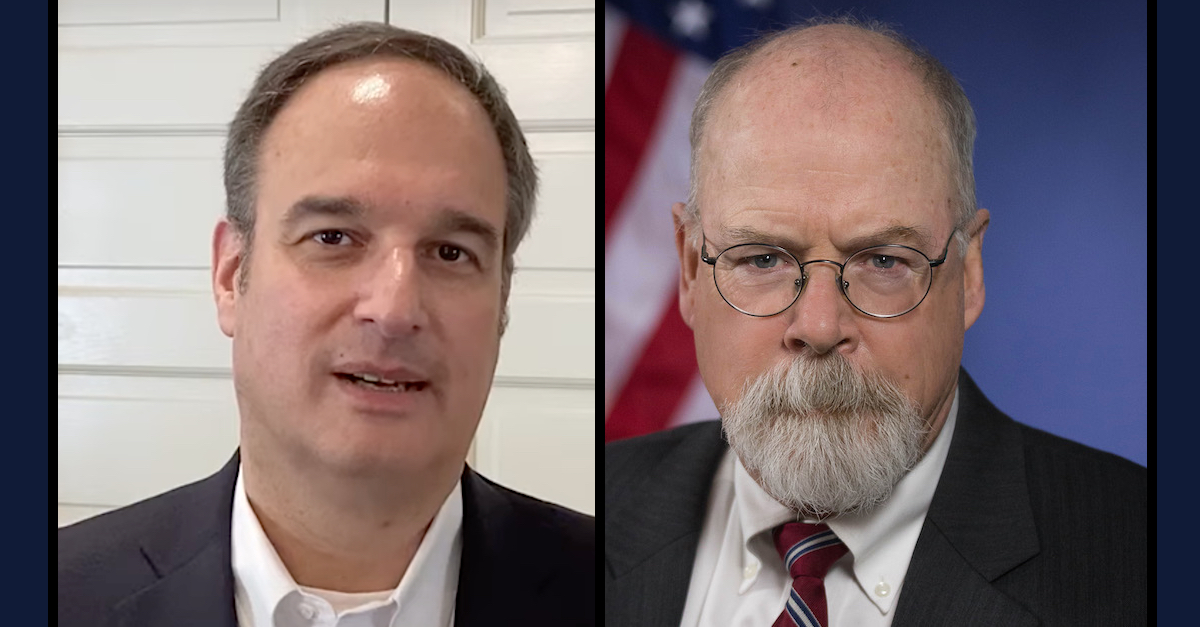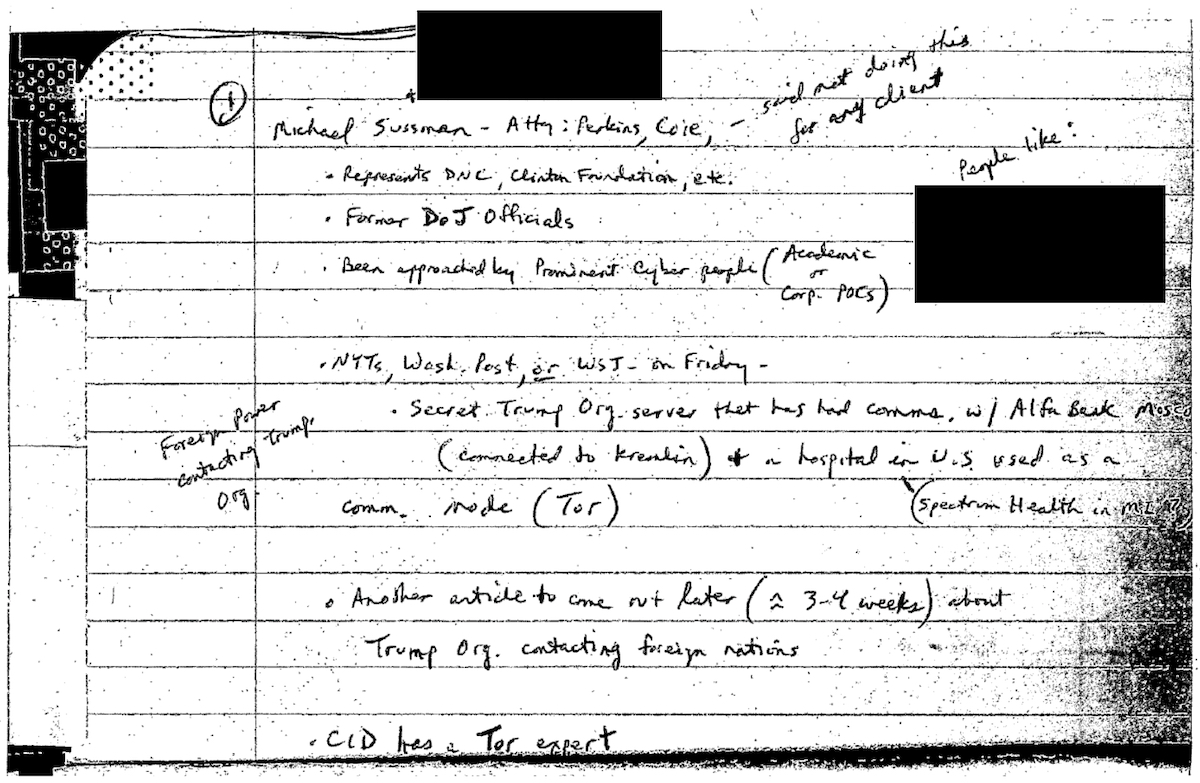
Michael Sussmann and John Durham.
A former Perkins Coie cybersecurity lawyer allegedly lied to the FBI in writing about the nature of his clients when he provided a tip in the weeks leading up to the 2016 presidential election, new court papers claim. The papers are part of a flurry of court motions which seek to sort out admissible from non-admissible evidence prior to trial.
The attorney, Michael Sussmann, is charged with a sole count of making a materially false statement to an FBI official in a probe launched by Special Counsel John H. Durham. Durham was appointed to investigate possible illegal activity surrounding “intelligence, counter-intelligence, or law-enforcement activities directed at the 2016 presidential campaigns, individuals associated with those campaigns, and individuals associated with the administration of President Donald J. Trump.” So far, Durham’s office has spent $2,823,973 toward those ends, though new figures which encompass the last six months should be forthcoming very soon. To date, Durham has netted three indictments and one guilty plea.
A Durham motion in limine — a court document which asks a judge to rule on an evidentiary matter before trial and therefore save the jury’s time — seeks to admit into evidence certain text messages Sussmann sent to the FBI. One message, which Durham’s team indicates was written on Sept. 18, 2016 at 7:24 p.m., “the night before the defendant met with the General Counsel,” allegedly memorialized the lie Sussmann is accused of promulgating. That message, as Durham’s team portrayed it, reads as follows (the word “availibilty” is misspelled in the original; “Jim” appears to be then-FBI general counsel James Baker):
Jim – it’s Michael Sussmann. I have something time-sensitive (and sensitive) I need to discuss. Do you have availibilty for a short meeting tomorrow? I’m coming on my own – not on behalf of a client or company – want to help the Bureau. Thanks. (emphasis added).
“Ok,” Baker responded, according to Durham’s filing. “I will find a time. What might work for you?”
“Any time but lunchtime – you name it,” Sussmann allegedly responded.
Durham’s team has long alleged that Sussmann turned “data” and “white papers” over to the FBI which “allegedly demonstrated a covert communications channel between the Trump Organization and a Russia-based bank” — Russia’s Alfa Bank in particular.
During a hearing last Thursday, Durham’s prosecutors and attorneys for Sussmann jockeyed with U.S. District Judge Christopher R. Cooper over the precise verbiage of Sussmann’s comments to the FBI. Sussmann’s attorneys have said that Sussmann did not lie or, in the alternative, that any lie was not “material” for the purposes of a criminal prosecution under 18 U.S.C. §1001(a)(2). Sussmann has pleaded not guilty to the charge. They said that essence — or the material portion of the tip Sussmann was providing — was the raw data he handed to the FBI. That data, per Sussman’s team, would have launched a probe into Trump’s doings regardless of who provided the information.
A portion of the Thursday hearing focused on precisely how Sussmann worded the tip and the concomitant assertion that he was not representing a partisan interest — or, really, any interest other than his own — when he spoke to Baker. The text message purports to clear some of that up.
Durham’s team countered that the FBI would have been skeptical and would not have acted upon the data had it known that Sussmann was, as Durham’s team has alleged, a partisan.
“The defendant’s billing records reflect that the defendant repeatedly billed the Clinton Campaign for his work on the Russian Bank-1 allegations,” Durham’s team continued in its recent motion in limine. “In compiling and disseminating these allegations, the defendant and Tech Executive-1 also had met and communicated with another law partner at Law Firm-1 who was then serving as General Counsel to the Clinton Campaign (‘Campaign Lawyer-1).”
The inference, according to Durham’s team, is that the “Tech Executive” (since identified as Rodney Joffe, who is not charged with any crimes) asked researchers to compile data which supported an “inference” or “narrative” that tied Trump to Russia. The data that was allegedly “exploited” included “domain name system (“DNS”) Internet traffic,” Durham’s team wrote.
Durham has also alleged that Sussmann was the one who leaked information to the press about “a mysterious back channel between the Trump Organization and [the Alfa Bank]” — to use the words of one subsequent article. According to Durham’s motion in limine:
For example, billing records and emails reflect that on September 1, 2016, the defendant met with the reporter who published the aforementioned Newspaper-1 article. The defendant billed his time for the meeting to the Clinton Campaign under the broader billing description “confidential meetings regarding confidential project.”
Besides the aforementioned text message to Baker, Durham’s team is asking Judge Cooper to admit as evidence witness notes of conversations with Baker, a bevy of emails, Sussmann’s statements to the government (either as direct evidence or as evidence of other wrongs or bad acts under Rule 404(b), and an Oct. 31, 2016 tweet by the Clinton Campaign. Durham’s team also wants the judge to “exclude evidence and preclude argument concerning allegations of political bias on the part of the Special Counsel.”
The notes include the following scribbles from FBI Assistant Director Bill Priestap. In those notes, Durham pointed out that Priestap indicated that Sussmann “said not doing this for any client,” but the proffered notes also immediately pointed out that Priestap knew Sussmann was attached to Perkins Coie and that either he, the firm, or both “Represents DNC, Clinton Foundation, etc.”

A screengrab of John Durham’s April 4, 2022 Motion in Limine contains a black-and-white copy Bill Priestap’s handwritten notes regarding Michael Sussmann.
The other “notes” are from Deputy General Counsel Trisha Anderson, who allegedly wrote: “No specific client but group of cyber academics talked w/ him about research.”

The notes of FBI Deputy General Counsel Trisha Anderson, as per a John Durham motion in limine filed April 4, 2022.
Durham wants these messages admitted into evidence as proof of Sussmann’s alleged attempts to shield the volatile political nature of the information Sussmann provided. He also seeks to introduce Clinton Campaign tweet issued by Hillary Clinton’s Twitter account: “Computer scientists have apparently uncovered a covert server linking the Trump Organization to a Russian-based bank.”
According to Durham:
The tweet included a statement from a Clinton Campaign advisor which made reference to the media coverage article and stated, in relevant part, that the allegations in the article “could be the most direct link yet between Donald Trump and Moscow[,] that “[t]his secret hotline may be the key to unlocking the mystery of Trump’s ties to Russia[,]” and that “[w]e can only assume that federal authorities will now explore this direct connection between Trump and Russia as part of their existing probe into Russia’s meddling in our elections.”
The Durham motion continued:
The above-referenced tweet is not hearsay because it is not being offered for its truth. Indeed, the Government believes that the tweet’s assertions regarding a “covert server” between the Trump Organization and Russian Bank-1 are false. The Government will instead offer this tweet to show the existence of the defendant’s attorney-client relationship with the Clinton Campaign, which is directly relevant to the false statement charge. In particular, and as detailed above, the evidence at trial will demonstrate that the defendant provided the Russian Bank-1 allegations to the media for the purpose of benefiting the Clinton Campaign, and his billing records reflect that he repeatedly billed the campaign for this work. Such efforts also continued after the defendant’s meeting with the FBI General Counsel. For instance, on October 10, 2016, the defendant emailed the aforementioned Newspaper-1 reporter an opinion article regarding Trump, suggesting that the the reporter should share it with his “editors” in an apparent effort to help the reporter convince them to publish an article regarding the Russian Bank-1 allegations. In addition, on the date these articles were finally published, the defendant again billed the Clinton Campaign for his communications with both reporters who authored them.
The fact that the Clinton Campaign immediately issued a tweet concerning the articles – after receiving foreknowledge of these issues from the Law Firm-1 – is probative of the defendant’s client relationship. Indeed, the Government will offer this evidence to prove, among other things, that one of the defendant’s primary goals in his work on the Russian Bank-1 allegations was to generate negative publicity concerning Trump that would benefit the Clinton Campaign. Accordingly, the tweet is admissible as non-hearsay.
Sussmann’s attorneys filed their own motions in limine on Monday evening as well.
One of those documents seeks to bar Durham from admitting information encapsulated and protected by attorney-client privilege into evidence — a move Sussmann’s people say is both “extraordinary” and “improper” on Durham’s part.
Another of those documents skewers Durham’s team for attempting to introduce the aforementioned notes into evidence:
When the defendant, Michael A. Sussmann, met with James Baker in September 2016, Mr. Baker did not record the meeting, take any notes of the meeting, create an official report of the meeting, or otherwise memorialize it. Now, in an improper attempt to bolster Mr. Baker’s testimony, the Special Counsel seeks to publish or adduce evidence of notes that two people who were not even in the meeting took regarding what was allegedly said in the meeting, even though these two people—Assistant Director E. William “Bill” Priestap of the Federal Bureau of Investigation (“FBI”)’s Counterintelligence Division and former FBI Deputy General Counsel Trisha Anderson—have no reliable memory of even speaking to Mr. Baker about the meeting. The Special Counsel claims that the notes may be properly admitted as past recollections recorded of Mr. Baker’s prior consistent statements. The Special Counsel is simply not correct, and Mr. Sussmann accordingly moves to preclude introducing the notes, eliciting any testimony about them, or publishing them.
Yet another motion asks Judge Cooper to dismiss the case if Joffe does not receive immunity from Durham. The document asserts that Joffe is willing to testify for Sussmann but that he cannot given Durham’s alleged penchant for “manufacturing incredible claims of continuing criminal liability for Mr. Joffe that are forcing Mr. Joffe to assert his Fifth Amendment right.”
Finally, Sussmann’s attorneys have asked Judge Cooper to ban Durham’s lawyers from introducing the following types of evidence, all three of which they refer to as the “Joffe and Steele Conduct”:
(1) the gathering of DNS data by Mr. Sussmann’s former client Rodney Joffe, and/or other data scientists, and fellow business personnel of Mr. Joffe (collectively “Mr. Joffe and Others”); (2) the accuracy of this data and the accuracy of the conclusions and analysis based on this data; and (3) Christopher Steele and information he separately provided to the Federal Bureau of Investigation (“FBI”) (including the so-called “Steele Dossier”).
Read the filings below. We’ve added a separate page after page five in Durham’s filing because the original screen shot of Priestap’s notes does not appear properly in some browsers. We’ve also combined all of Sussmann’s filings into one embed to make them easier to read:
[Photo of Sussmann via YouTube screengrab; photo of Durham via U.S. Department of Justice portrait.]